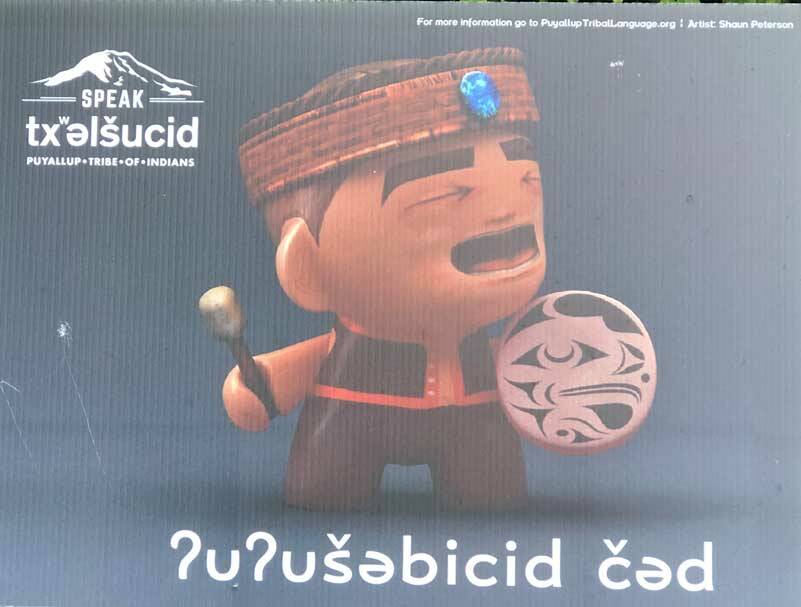By Morf Morford
Tacoma Daily Index
Back in those distant days of life before COVID, when we could gather at cultural events, you may have noticed an increasing tendency to acknowledge the residents and cultures that inhabited the land we currently hold.
These statements, both written and spoken, have been somber and reflective – and often awkward.
Descendants of those peoples are in fact still here. And the repercussions of treaties and policies (treaties are Congressionally approved and NOT subject to local interpretation or enforcement) and promises kept (or not) still impact laws and individual lives.
As I’ve attended events that begin with these statements of acknowledgement, I am struck by how they are usually received.
As I mentioned, these statements are virtually always the first statements made and, in almost every case, are presented as something like a prayer; a call to reflection and thanks, a reminder that there were people here before us, their descendants, culture and place names still very much among us.
Between the lines is the sense that we are not alone, that the people, with numbers vastly diminished, thrived on this land, knew it well (as we almost certainly never will) and just might be here long after we are gone.
The Seattle NHL Kraken brought this into focus with their ‘Land and Peoples Acknowledgement’ statement at a recent gathering of local Native leaders.
These statements, to put it mildly, are complicated.
If you or your organization wish to acknowledge, at whatever level, indigenous influence, here are some basic guidelines;
Start with self-reflection.
Before starting work on your land acknowledgment statement, ask yourself a few basic questions;
Why are we doing this land acknowledgment?
If you’re hoping to inspire others to take action to support Indigenous communities, you’re on the right track.
If you’re delivering a land acknowledgment out of guilt or because everyone else is doing it, more self-reflection might be required.
Why are we doing this? What response are we working toward? In other words, what do you hope listeners will do after hearing the acknowledgment?
When will I have the largest impact?
Consider those two keystones of public speaking; timing and audience.
Do your homework.
Put in the time necessary to research the following topics:
The Indigenous people to whom the land technically or historically belongs.
The history of the land and any related treaties.
Names of living Indigenous people from these communities. If you’re presenting on behalf of your work in a certain field, highlight Indigenous people who currently work in that field.
Indigenous place names and language.
Correct pronunciation for the names of the Tribes, places, and individuals that you’re including.
Don’t be afraid to use appropriate language.
History, especially local history can be messy, unpleasant and dense with contradictions and difficulties.
Don’t sanitize the past with vague terminology. Use words (as appropriate) like genocide, ethnic cleansing, stolen land, or forced removal to reflect historical events.
Use past, present, and future tenses. Indigenous people are still here. Don’t treat them as museum pieces or as relics of the past.
Land acknowledgments shouldn’t be grim. They should function as living celebrations of Indigenous communities.
Ask yourself, “How am I leaving Indigenous people in a stronger, more empowered place because of this land acknowledgment?” Focus on the positivity of who Indigenous people are today.
Additional factors to consider:
Don’t ask an Indigenous person to deliver a “welcome” statement for your organization. Watch out for condescending tokenism from your organization.
Build real, authentic relationships with Indigenous people. In addition to normal employment and family obligations, Indigenous people are working to heal their traumas, learn their languages, and support their nations. If you reach out for help, lead the conversation by asking an Indigenous person what you can do for them. Listen to them.
Be sure to compensate Indigenous people for their emotional labor. If you reach out to an Indigenous person or community for help, compensate them fairly. For whatever reason, Indigenous people are usually asked to perform emotional labor for free.
Try to understand displacement and how that plays into land acknowledgment. Land acknowledgment is complicated. Remember that the United States government displaced many Tribes from land before treaties were signed. And once signed, not always honored.
Don’t expect to find a specific formula or template. There are many types of land acknowledgments. Land acknowledgments that come from Indigenous people vs. non-Indigenous people will look different.
And perhaps most importantly, land acknowledgment alone is not enough. It’s a point of beginning.
Like our local Native people, our land defines who we are.
We too will leave our mark on the world, and it will leave its mark on us.
We often hear life described as a journey, here again, Native people take a longer view.
The welcoming art piece at the entryway of Kraken Community Iceplex shows seven large paddles (representative of seven generations of ancestors and the next seven future generations, plus the traditional canoe journey) and one hockey stick representing the eighth generation.
The point is simple enough; we exist in a strand of multiple generations reaching back and forward that, recognized or not, impacts our attitudes and values.
From how we treat each other to our care (or neglect) of our neighborhoods and environment, our actions will always reach beyond our own lives.
Will future generations thank us for our investment in them or will they marvel at our contempt for them and for nature in our legacy of toxic waste?
As always, it is up to us.
**************
Kraken Land and Peoples Acknowledgement Statement
The Seattle Kraken acknowledges that we are on the homelands of the Coast Salish peoples, who continue to steward these lands and waters as they have since time immemorial. We recognize Washington’s tribal nations and Native organizations, who actively create, shape and contribute to our thriving communities.
The Seattle Kraken are committed to doing our part to engage with, and amplify the voices of, Native peoples and tribes. https://www.nhl.com/kraken/news/seattle-kraken-present-land-and-peoples-acknowledgement-to-salish-tribal-leaders/c-325974584






